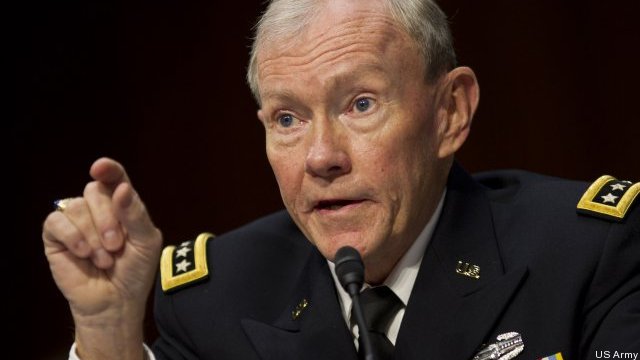Humans, Not Hardware, Will Get Military Through Tough Times: Dempsey
Posted on

VIRGINIA BEACH, VA: In an era of shrinking budgets, the military’s future is less about buying new hardware than making better use of what it already has, the armed forces’ top officer said yesterday, and that kind of change requires focusing not on equipment but on people.
“It’s the human dimension that will get us through this, and we have to think our way through it, not bludgeon our way,” said Gen. Martin Dempsey, chairman of the Joint Chiefs of Staff, at the start of his remarks at the annual Joint Warfighting Conference hosted by the US Naval Institute and the electronics industry group AFCEA. “We have some pretty amazing materiel capabilities coming online,” Dempsey went on — he cited cyberwarfare in particular as “one of those areas where our actual capabilities are beginning to resemble science fiction” — “but actually the non-materiel changes we make will matter more.”
For one thing, new hardware just takes a long time to roll out. “The major building blocks of today’s force will still be around in eight years,” said Dempsey. “About 80% of Joint Force 2020 is either programmed or already exists today.” That said, he went on, “we can significantly change the other 20% of the force,” which in turn can enable change in how the 80% is used.
The context for this change is what Dempsey called the 21st century “security paradox”: The world is actually getting more peaceful overall, but the potential for catastrophic violence keeps increasing. “In evolutionary terms, the human race has never before experienced such low levels of violence,” he said. “On the other hand, destructive technologies are proliferating in two directions: They’re proliferating horizontally across advanced militaries and vertically into the hands of non-state actors….. More people have the ability to harm us or to deny us freedom of action than at any point in my professional life.”
As about China and Russia specifically, Dempsey hastened to say the US seeks friendship, not a new Cold War. Just the day before at the same conference, Retired Vice Chairman of the Joint Chiefs James “Hoss” Cartwright had warned that the Air Force and Navy’s new “AirSea Battle” concept in particular “is demonizing China” in dangerous ways, but Dempsey declared that “it’s not at all aimed at any particular country.”
More broadly, Dempsey said, “on the relationship with China and Russia, I’ve told many people that we really have to avoid Thucydides’ trap.” The ancient Greek historian argued that Sparta went to war with Athens because it fear the Athenians’ increasing power, making conflict a self-fulfilling prophecy, and sparking a series of conflicts that ultimately ruined both sides. “We ought to aspire to be the superpower that breaks that paradigm, and we’re already doing it,” Dempsey said. “We’ve got terrific mil-to-mil [military to military] relationships” with both countries.
It is such human relationships, Dempsey argued, that are crucial to the US military’s success even in an era where human interaction is increasingly virtual. As the armed forces figured out how to apply classical counterinsurgency doctrine in Afghanistan and Iraq, he said, “those successes were really built on the foundation of strong relationships” between US troops and local tribal leaders, police, informants, and for that matter between US military and civilian government personnel working together as never before. “The first time I actually ever met anyone from the State Department I was a lieutenant colonel with 22 years of service,” Dempsey said, but today 22-year-old lieutenants routinely work with State, USAID, and other agencies. “Now, it’s not just counterinsurgency campaigns that need those relationships and ideas,” Dempsey said: Learning how to work with people outside your own organization is equally crucial in combating terrorist networks, narcotics cartels, pirates, and the proliferation of weapons of mass destruction.
Computer networks offer a new tool to build those human networks, Dempsey said, but we can’t become too reliant on that tool, because the spread of disruptive technologies like hacking means an ever-wider variety of potential enemies can yank our high-tech crutches out from under us. “GPS is terrific when it’s working, but if it gets jammed we have to be ready to continue the mission,” he said. “We need to simulate degraded environments and stress-test each of our systems.”
In the end, said Dempsey, “our best hedge against degraded environments is mission command and adaptive leadership” — the ability of leaders at all levels to think for themselves and find a new way to achieve the objective without waiting for orders. That’s a cultural challenge for the military given a long-established preference for detailed, centralized planning, and modern networks that give top commanders constant computer connectivity to their subordinates only makes micromanagement easier.
“When I was at TRADOC” — the Army’s Training and Doctrine Command — “we started talking about mission command and there were some [officers] I have a great deal of respect for who contacted me, most of them were in retirement, [who] said you’re not going to be able to do this,” Dempsey recalled. “They said to me mission command relies on trust, you’ll never be able to develop that kind of trust” between superiors and subordinates. Said Dempsey, “I took that as a challenge.”
Subscribe to our newsletter
Promotions, new products and sales. Directly to your inbox.
